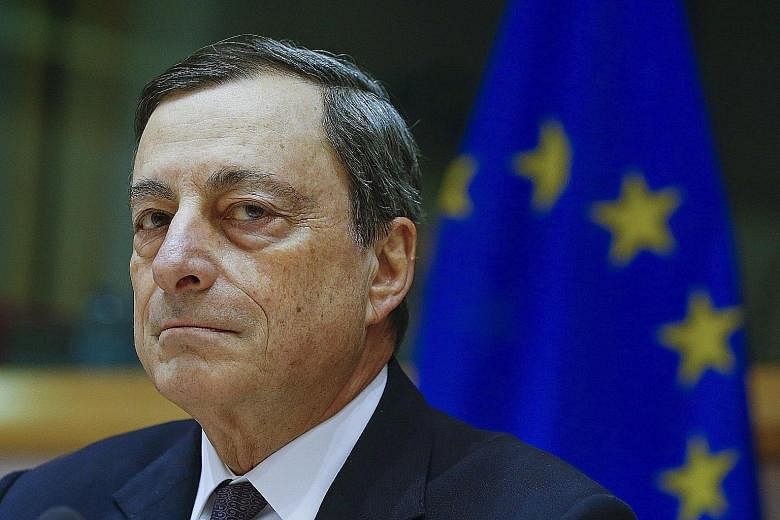FRANKFURT • The volatility playing havoc with European bank stocks in recent weeks is primarily due to market nerves about the slowdown in global growth rather than misperceptions about the direction of financial regulation, European Central Bank president Mario Draghi said.
"Current market developments appear to be more related to general factors concerning weakening economic activity," Mr Draghi said during a hearing at the European Parliament on Monday.
Measures by regulators to reduce risk and bolster capital levels have had "the effect of making the banks stronger", he said. "If we had these fluctuations before the crisis, I am pretty sure the whole system would have been much more fragile than it is today."
In testimony lasting more than two hours, the ECB president was peppered with queries from parliamentarians over the struggles besetting the region's lenders, from the application of new bail-in rules to progress in working through the legacy of bad loans from the financial crisis.
In his introduction, Mr Draghi signalled that the ECB would be ready to take action if it became evident that snags in the banking sector were impeding monetary stimulus from reaching the economy.
Investors have fled bank stocks from Italy to Germany this month. The Stoxx Europe 600 Banks Index, a gauge of 47 regional companies involved in the banking sector, has lost more than 20 per cent since the start of the year, and measures of risk on banks and insurers in Europe have hit the highest since at least 2013.
They are expecting Mr Draghi to deliver more stimulus and not disappoint them for a second time when the ECB president is set to give his next policy announcement on March 10.
Traders are positioned for a monetary-easing bonanza, judging from the pace at which euro- region bond yields are dropping to new lows.
Mr Draghi also told the European Parliament on Monday that lower oil prices and market turbulence might prod the ECB to take action to revive inflation.
"This is how dovish rhetoric can bite," said Mr Peter Chatwell, head of rates strategy at Mizuho International in London.
"The market believes that the ECB will do more in March, hence such a high proportion is trading below the current deposit rate."
Mr Draghi stressed that the region's nascent banking union works better if the same rules are applied across countries when lenders are failing.
Diverging treatment of bondholders in Italy and Portugal last year, just before new regulations on applying losses took effect on Jan 1, may have contributed to sell-offs.
"Equal implementation across the euro zone will give the creditors certainty that they are being treated equally," Mr Draghi said.
"We talk a lot about banking union but, if we don't have equal treatment under the application of the bail-in rules, we will be far from a banking union. That's where improvement is needed."
BLOOMBERG

